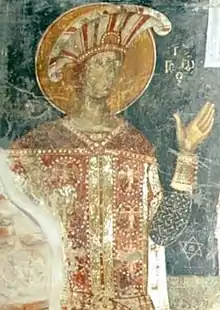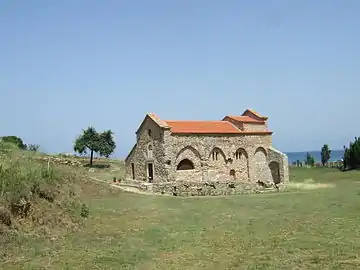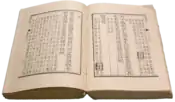Andrea II Muzaka
Andrea II Muzaka (1319 - 1372) was a formidable Albanian noble of the Muzaka family and the ruler of the Principality of Muzaka.[1] His grandfather is known as one of the first notable rulers of the principality and also the titular "marshal of Albania". His father was Teodor I Muzaka or "keshetsi" which means long hair one. Andrea Muzaka as a noble person of the Muzaka family became the ruler of the principality after his father's death in 1331.
Andrea II Muzaka | |
|---|---|
| Despot of Albania | |
 Andrea II Muzaka on a fresco in the Church of St. Athanasius of Mouzaki, Kostur | |
| Reign | 1331-1372 |
| Predecessor | Teodor I Muzaka |
| Successor | Teodor II Muzaka |
| Titles and styles
Despot | |
| Born | 1319 |
| Died | 1372 St Anthony, Durrës |
| Noble family | House of Muzaka |
| Father | Teodor I Muzaka |
Andrea is known as a prominent medieval Albanian noble and a hero who defeated the king Vukasin in a great battle thus promoting the nobility of the family's rule into a Despotate, being one of the main figures of resistance against the short-lived growing empire of Serbia, and also significantly expanding the principality of Muzaka in central Albania.[2]
Rule
First reign
Andrea II Muzaka came from the noble family of Muzaka, who were wealthy in central Albania. His grandfather Andrea I Muzaka established a de facto independent territorial rule around 1280 in the area Myzeqe west of Berat, later named after the family.[3] After Andrea I, the next ruler would become Teodor or "Keshetsi", Teodor's son, Andrea II would become the most prominent ruler of the Muzaka noble family in medieval era. Andrea like his father served the Angevins as the marshal of Albania, however, he held various other titles such as sebastokrator latter Despot and even granter title such as "Despot of Albania" (Despoto Albanie). At the beginning of his rule he exercised nominal rule over much of the country of Adriatic sea between Vjosa and Devoll rivers eastwards but in practice this continued to be dominated by the historic Albanian noble families who paid little heed to Muzaka's authority.[4]
Andrea held alliance both diplomatic and friendship with the Angevins, other noble members of family were always allowed to go to Durrës which at that time was held by the Anjou-durrazo family. According to the medieval Albanian historian Gjon Muzaka, Andrea would defeat the King Vukasin in a great battle, therefor in his honor it would be given the second highest title below to Emperor, that of Despot by the Emperor of the Byzantine Empire, which he had been a great threat to him and his nominal substantially weakening Empire, as well as the coat of arms of the Muzaka family would be replaced with the new double-headed eagle flag[5]
As soon as Andrea II Muzaka had obtained the title of despot, he endorsed an anti-Byzantine revolt (1335-1341) in his domains, and also formed an alliance with the Anjou from Naples on 30 December 1336, whereas he was recognized as a vassal of Robert, Prince of Taranto. As proof of his fidelity to the Capetian House of Anjou, Andrea II Muzaka had to leave one of his sons as hostage in Durazzo.
Resistance against the Serbians
During the period 1341-1347 the Byzantine Empire was going through a deep civil war which hastened the Serbians to take it advantage out of it and start an invasion all over into the southern Balkans. The despot Andrea held great resistance and formed various alliances with other Albanian noble families and with the Anjou as well. In 1336, the short-lived Serbian Empire under Stefan Dušan captured Angevin-controlled Durazzo. Although Angevins managed to recapture Durazzo, Dušan continued his expansion, and in the period of 1337—45 he had captured Kanina and Valona (in modern-day southern Albania).[6] Andrea Muzaka waged against the Serbian forces around 1340 when forces of Andrea defeated the Serbian army at the Pelister mountain.[6] Andrea Muzaka with an alliance with the Gropa family would have several other successful campaigns against Dusan, however although in a short period of time his domains like with the other Albanian principalities would eventually be invaded by the Serbian King.[7]
Second reign
After the death of Stefan Dušan in 1355 and collapse of the short-lived Serbian Empire, the despot Andrea regained control over parts of the south-eastern modern-day Albania and significantly expanded the principality over northern Greece with Kastoria after the Battle of Marica in 1371 which he had captured from Prince Marko.[8][9] One year latter Andrea would die in 1372 and the rule would be passed to his son Teodor II, he would be buried with his wife in St. Anthony Church, Durrës

Family
Andrea II Muzaka married Efimijen (also: Eythvmia, Etinia, Onorata), daughter of Pal Mataranga, Lord of Gora, with whom he had five children:
- Gjin Muzaka (* around 1337; † 1389)
- Teodor II Muzaka (* 1337; † after 1389)
- Stoya († after 1384)
- Comita († 1392) ∞ Balša II By Cedda (Zeta?) [10]
- Chiranna (also: Kyranna)
See also
References
- https://www.google.com/books/edition/The_Constantinian_Order_of_Saint_George/GBjRDwAAQBAJ?hl=en&gbpv=1&dq=andrea+II+muzaka&pg=PA501&printsec=frontcover
- "1515 | John Musachi: Brief Chronicle on the Descendants of our Musachi Dynasty". Albanianhistory.net. Archived from the original on 10 September 2010. Retrieved 11 October 2010.
- >http://www.google.com/books/edition/T%C3%83_huajt_p%C3%83r_shqip%C3%83rin%C3%83_dhe_shqiptar/ZNIcAgAAQBAJ?hl=en&gbpv=1&dq=andrea+I+muzaka&pg=PA102&printsec=frontcover
- https://www.google.com/books/edition/The_Constantinian_Order_of_Saint_George/GBjRDwAAQBAJ?hl=en&gbpv=1&dq=andrea+II+muzaka+despot&pg=PA501&printsec=frontcover
- "1515 | John Musachi: Brief Chronicle on the Descendants of our Musachi Dynasty". Albanianhistory.net. Archived from the original on 10 September 2010. Retrieved 11 October 2010.
- Fine, John V. A. (1994). The Late Medieval Balkans: A Critical Survey from the Late Twelfth Century to the Ottoman Conquest. University of Michigan Press. pp. 290–291. ISBN 978-0-472-08260-5.
- Braudel, Fernand (1995). The Mediterranean and the Mediterranean world in the age of Philip II, Volume 2. p. 664. ISBN 0-520-20330-5.
- Gillian Gloyer (1 June 2010). Albania (in Spanish). Alhena Media. p. 103. ISBN 978-84-92963-50-8.
Tras la muerte de Stefan Dušan en 1355, el área que se corresponde con el sureste de la actual Albania y hasta Kastoria (que hoy en día pertenece a Grecia) cayó en manos de la familia Muzaka de Berati, uno de los poderosos clanes
- John V. A. Fine; John Van Antwerp Fine (1994). The Late Medieval Balkans: A Critical Survey from the Late Twelfth Century to the Ottoman Conquest. University of Michigan Press. p. 380. ISBN 978-0-472-08260-5.
... Andrew Musachi .... took Kastoria from Marko...
-
Literature 
Major forms Genres Media Techniques History and lists Discussion  Literature portal
Literature portal
